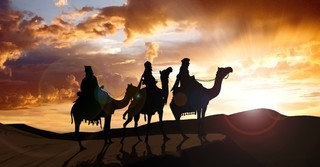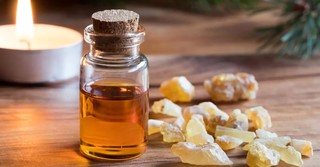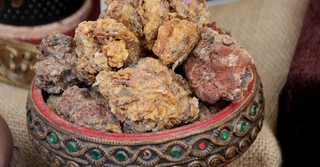Why Were Gold, Frankincense and Myrrh Gifted to Baby Jesus?
Share

The Christmas season abounds with stories and songs about the amazing work that God did on behalf of the world. He sent His only Son to be born as a human baby, to live life among us and finally, to save us. That is definitely cause for joyous celebration
So many beautiful carols help us remember parts of this wondrous account. One that I’ve always found quite moving is “We Three Kings.” When I sing it, I can't help but think about the trip that the wise men took: How did they know to follow that bright star to find the Christ child? Why did they bring gold, frankincense and myrrh as gifts for Him?
Using the song as my starting point, I decided to explore Scripture to find both the reasons for the wise men’s journey, and the significance of each of the gifts they brought to Jesus.
“When they saw the star, they were overjoyed. On coming to the house, they saw the child with his mother Mary, and they bowed down and worshiped him” (Matthew 2:10-11).
Photo credit: Unsplash/Jonathan Meyer
Why Did the Magi Travel to Bethlehem?

“We three kings of orient are
Bearing gifts, we traverse afar
Field and fountain, moor and mountain
Following yonder star”
(from the Carol “We Three Kings")
The Magi were a class of scholars in Persia who were especially interested in astronomy and alchemy, a science related to chemistry. One of their influences was Balaam, a sorcerer whom God used to send a prophetic message about the coming Messiah. It reads,
“I see him, but not now; I behold him, but not near. A star will come out of Jacob; a scepter will rise out of Israel. He will crush the foreheads of Moab, the skulls...” (Numbers 24:17).
Later, Daniel tells in his book how he became a respected member of this group during his Babylonian captivity. Daniel, too, had a vision about the Christ, through a message from the angel Gabriel:
“Know and understand this: From the time the word goes out to restore and rebuild Jerusalem until the Anointed One, the ruler, comes, there will be seven ‘sevens’, and sixty-two 'sevens’ (Daniel 9:25).
As the time approached for the “Anointed One” Daniel mentioned to arrive, it is thought that the Magi joined these two prophesies together. Ready and alert for the sign of a star to guide them, they recognized it in the sky and felt led to follow it.
Note: Carols and Nativity scenes tend to portray the popular notion of just three wise men. But one of the first things I discovered was that the Bible doesn't say how many there were. Perhaps many more than three traveled in a caravan across the desert to Bethlehem. The idea of three probably originated to go along neatly with the three categories of gifts, but isn’t confirmed as truth.
Photo credit: ©GettyImages/Pink_frog
Why Did They Bring Gifts?

“Then they opened their treasures and presented him with gifts of gold, frankincense and myrrh” (Matthew 2:11).
Everyone in that culture who had the means observed the tradition of bringing gifts to pay tribute when visiting a king. It showed a respect of royalty’s stature and power in their society.
“Many brought offerings to Jerusalem for the LORD and valuable gifts for Hezekiah king of Judah” (2 Chronicles 32:23).
“May the kings of Tarshish and of distant shores bring tribute to him. May the kings of Sheba and Seba present him gifts” (Psalm 72:10).
The Magi knew that this child would one day be their Deliver and even greater, the Ruler of all Nations. The gifts they brought needed to reflect the esteem and awe that they felt towards this King/Messiah.
Photo credit: Unsplash/Ben White
Gold

The most common word for gold in the Old Testament is “zahabh” (Hebrew) or “dhahab” (Arabic) and has been coupled with descriptors like pure and refined. Gold represented wealth in both the ancient secular and spiritual world, and was considered a treasure by all.
First used in adornments such as the nose rings and bracelets given to Rebekah in Genesis 24, gold became highly valued by the wealthy. It started appearing in their furnishings, clothing and even their carriages. Other forms of it at the time were nuggets, slabs and dust.
The Hebrews prized it as well. For instance, the Ark of the Covenant was overlaid with pure gold. The mercy seat of the Tabernacle and the drinking-vessels of Solomon contained gold, along with utensils, candlesticks, dishes, bowls, curtain rods, and many other items.
Gold became associated with:
- Anything of great value: “Choose my instruction instead of silver, knowledge rather than choice gold…” (Proverbs 8:10).
- Nobility: “So he set a royal crown on her head and made her queen instead of Vashti” (Esther 2:17).
- Worship to God: “These are the offerings you are to receive from them: gold, silver and bronze…” (Exodus 25:3).
In light of all the prophecies they knew, the Magi would naturally have considered taking this precious metal to present to the Christ.
Photo credit: Pixabay/moritz320
Frankincense

Frankincense is a fragrant resin that comes from a type of Boswellia tree found in what is now Arabia and Palestine. The first part of the name, “frank", refers to the way it gives off its strong aroma when lit, and how long and steadily it burns.
This resin already had a history of being used in the temple. The priests utilized it as a base for incense, as well as an ingredient of meat offerings they made on behalf of God’s people.
"'When anyone offers an offering of a meal offering to Yahweh, his offering shall be of fine flour; and he shall pour oil on it, and put frankincense on it” (Leviticus 2:1).
“You shall put oil on it, and lay frankincense on it: it is a meal offering” (Leviticus 2:15).
“...then the man shall bring his wife to the priest, and shall bring her offering for her: the tenth part of an ephah of barley meal. He shall pour no oil on it, nor put frankincense on it, for it is a meal offering of jealousy, a meal offering of memorial, bringing iniquity to memory” (Numbers 5:15).
Frankincense was considered to be quite a valuable item at this time. Because of its lovely perfume and its association with the temple, it would make sense for the Magi to include it as a gift to pay homage to their Messiah.
Photo credit: ©Getty Images/Madeleine_Steinbach
Myrrh

According to some scholars, myrrh (“mor” or in Arabic, “murr”): had a greater value than gold when Jesus was born. A dried gum obtained from the balsam tree, it served many ceremonial and practical uses.
Exodus 30 mentions myrrh as an ingredient in the “oil of holy anointment”: “Also take fine spices: of liquid myrrh, five hundred shekels…” (Exodus 30:23). It was sometimes a component of the temple incense.
The scent of myrrh is acknowledged in several Old Testament passages:
“All thy garments smell of myrrh, and aloes and cassia…” (Psalm 45:8).
“I have perfumed my bed with myrrh, aloes, and cinnamon” (Proverbs 7:17).
“Who is this who comes up from the wilderness like pillars of smoke, perfumed with myrrh and frankincense, with all spices of the merchant?” (Song of Songs 3:6).
Myrrh also had a medicinal quality in areas like oral health and treatment of arthritis. The Jews used it to offer pain relief to those who were physically suffering. Finally, it was used in embalming.
Myrrh may seem like an odd gift to celebrate the birth of a baby. But the Magi may have brought the spice with them less for its daily uses and more for it's great worth.
Many believe that the wise men brought these three specific gifts as representations of Jesus: the gold signifying His Kingship; the frankincense denoting His Deity; and the myrrh a foreshadowing of His death. Others say that the gifts were given as a means to help the child's family financially.
Whichever might be true, my study showed me that the Magi knew and respected the prophecies about the coming Messiah, deliberately traveled to worship Him, and carried gifts they thought would show Him honor. Learning about all they did to worship Jesus has inspired me to give more thought to the worship I show Him everyday.
Photo credit: Pixabay/Leo_65
Heather Adams is an author, speaker, and singer living in Connecticut. Heather’s passion is to equip and encourage believers to seek more of God’s truth and to experience more of His joy each day. Her book, “Bow Down: The Heart of a True Worshipper” is a practical, 30-day devotional about worship. Worship Walk Ministries, her blog, offers weekly Scripture passages and insights to ponder. Heather shares her home with her family, an English setter named Marcie and Galaxy, the most curious cat she’s ever met. You can connect with her on her website: heatheradamsworshipwalk.com
